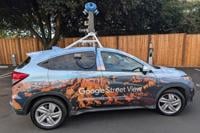PALO ALTO, Calif. (AP) — Google Maps is heading down a new road steered by artificial intelligence.
The shift announced Thursday will bring more of the revolutionary AI technology that Google already has been to the digital maps service that the internet company launched nearly 20 years ago as part of its efforts to expand into new frontiers.
Google Maps recently surpassed 2 billion monthly users worldwide for the first time, a milestone that illustrates how dependent people have become on the service’s directions during their daily commutes and excursions to new places. With the introduction of Google’s AI-powered Gemini technology, the maps are now being set up to become entertainment guides in addition to navigational tools.
Starting this week in the U.S. only, users will be able to converse with Google Maps to ask for tips on things to do around specific spots in a neighborhood or city and receive lists of restaurants, bars and other nearby attractions that include reviews that have been compiled through the years. The new features will also provide more detailed information about parking options near a designated destination along with walking directions for a user to check after departing the car.
“We are entering a new era of maps,” Miriam Daniel, general manager of Google Maps, told reporters Wednesday during a preview of the features presented in Palo Alto, California. “We are transforming how you navigate and explore the world.”
Google Maps also is trying to address complaints by introducing more detailed imagery that will make it easier to see which lane of the road to be situated in well ahead of having to make a turn.
In another AI twist, Google Maps is going to allow outside developers to tap into the language models underlying its Gemini technology to enable pose questions about specific destinations, such as apartments or restaurants, and get their queries answered within seconds. Google says this new feature, which initially will go through a testing phase, has undergone a fact-checking procedure that it calls “grounding.”
Google's Waze maps, which focus exclusively on real-time driving directions, will use AI to offer a conversational way for its roughly 180 million monthly users to announce hazards in the road and other problems that could affect traveling times.
The decision to bring AI into a service that so many rely upon to get from one point to the next reflects Google's growing confidence in its ability to prevent its Gemini technology from providing false or misleading information, also known as “hallucinations,” to users. Google's AI has already been caught hallucinating in some of the summaries that began rolling in May, including advice to put glue on pizza and an assertion that the fourth U.S. president, James Madison, graduated from the University of Wisconsin, located in a city named after him.








































